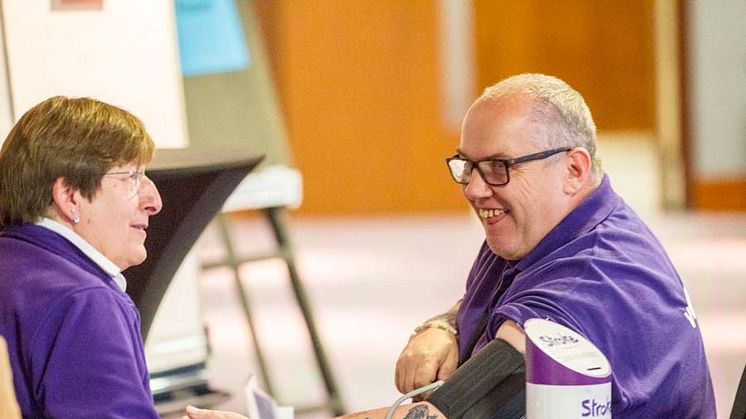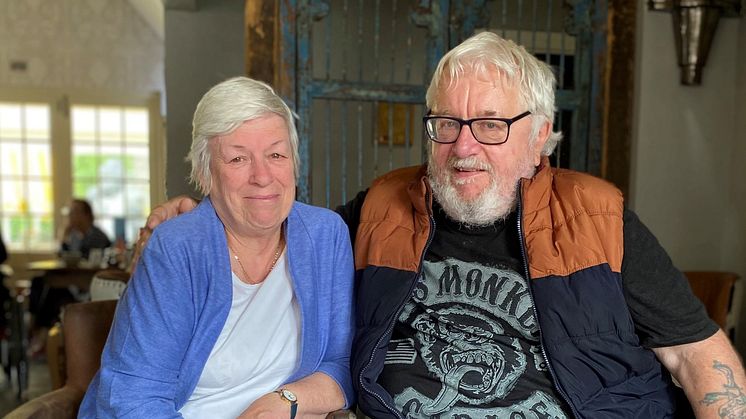
Press release -
Life without communication a fear for nearly half the population, but reality for 350,000 stroke survivors
Stroke Association shares survey to mark Aphasia Awareness Month
The fear of being unable to communicate has been laid bare in a new survey (i) of over 2,000 people across the UK. Research conducted by the Stroke Association reveals that nearly half of the respondents (41 %) can’t imagine living in a world where they couldn’t communicate. A world without communication is an everyday reality for the 350,000 stroke survivors(ii)like Tom Middlemass (61), from Edinburgh, in the UK living with aphasia – a communication disability, that is most commonly caused by stroke.
The research has been carried out by the Stroke Association to mark Aphasia Awareness Month and to encourage stroke survivors living with aphasia to use the information and support that’s available from the charity so they can navigate the challenges aphasia brings.
Aphasia can affect a person’s ability to speak, read, write and use numbers, but it does not affect intellect.
The charity’s latest survey also reveals people’s biggest fears if they lost their ability to communicate:
- Over a quarter (27%) of people feared not being able to carry out everyday activities
- · Over a quarter (27%) of people feared how it would affect their relationships with family and loved ones
- Around one in five people (19%)feared being lonely
- 12% feared not being able to express their emotions
- 4% feared losing their job or losing their friends.
Tom Middlemass from Edinburgh had a stroke at the age of 52 in 2016. He couldn’t move or speak at first. At the time, he had an overwhelming instinct to get up off the floor, but couldn’t make himself understood.
Tom says: “It took three weeks for me to be understood properly and it was scary. I used a pen and paper at first to write down what I wanted to say and felt stupid not being able to get the words out. Shopping was a challenge as I found numbers hard to understand. I couldn’t socialise with friends, or go to the football with my daughters, I just felt embarrassed and unable to cope. Having relied on meeting in person and talking face to face, it was impossible to do so now.”
Thankfully, Tom is now mobile and able to talk. He volunteers for the Stroke Association, which allows him to give hope to others. Tom believes that there can be life after stroke and it can be good again.
He adds: “I would encourage everyone with aphasia to seek help. Find information, get advice and use the tools and services which charities like the Stroke Association provide, to help you with your recovery.
The charity’s survey also highlighted how vital communication is to our everyday lives(i):
- Nearly half (45%) of people said they rely most on meeting face to face or talking in person
- One in five people (20%) rely on email, text or instant messaging
- Around one in ten (13%) depend upon talking on the phone
- Almost one in ten (8%) rely most on reading for work or leisure.
For many stroke survivors with aphasia, these commonly used communication tools are either a challenge or impossible to use.
Juliet Bouverie, Chief Executive of the Stroke Association said:
“Aphasia is incredibly common after stroke, affecting one in three stroke survivors. It robs you of the ability to talk to loved ones, to do everyday tasks such as go shopping, use public services or get online - things we all take for granted. People with aphasia often feel lonely and isolated too, which can impact their relationships.
“But there is hope and the brain can recover and adapt. Stroke survivors with aphasia can make improvements as well as developing alternative ways of communicating. Get in touch with the Stroke Association to find out how we can help. We’re here to support people with aphasia to rebuild their lives and to regain their confidence and independence. Our “Getting Online for People with Aphasia” guide equips you with the skills you need to get online, keep in touch with family and friends and to connect with the stroke community. Support is also available through our stroke support groups, My Stroke Guide and communication support service.
“It’s also incredibly important for the public to be aware of what aphasia is, the things to look out for and to learn strategies that might help those with aphasia living in their community. We all have a part to play in adapting our communication to be inclusive for all.”
If you or someone you know is living with aphasia, visit stroke.org.uk/aphasia for information and support.
The ‘Getting Online for People with Aphasia’ guide is available at: www.stroke.org.uk/aphasiaonline
My Stroke Guide is available at: https://www.stroke.org.uk/finding-support/my-stroke-guide
Ends
For more information, contact: Angie Macleod, Communications Officer at the Stroke Association on 07810 118184 or email Angela.Macleod@stroke.org.uk
References
i) Statistics based on a 4Media Relations nationally representative survey of 2,005 members of the public, conducted in April 2022
(ii) Prevalence of aphasia and dysarthria among inpatient stroke survivors: describing the population, therapy provision and outcomes on discharge
https://www.tandfonline.com/doi/full/10.1080/02687038.2020.1759772
Notes to Editors
About the Stroke Association
- Stroke strikes every five minutes in the UK and it changes lives in an instant.
- The Stroke Association is a charity working across the UK to support people to rebuild their lives after stroke. We believe that everyone deserves to live the best life they can after stroke. From local support services and groups, to online information and support, anyone affected by stroke can visit stroke.org.uk or call our dedicated Stroke Helpline on 0303 3033 100 to find out about support available locally.
- Our specialist support, research and campaigning are only possible with the courage and determination of the stroke community and the generosity of our supporters. With more donations and support, we can help rebuild even more lives.
- To donate, please visit stroke.org.uk/donate
- The Stroke Association is a member of the Aphasia Alliance
https://aphasiaalliance.org can follow us on Twitter, Facebook , Instagram and LinkedIn
Topics
- Stroke strikes every five minutes in the UK and it changes lives in an instant.
- The Stroke Association is a charity working across the UK to support people to rebuild their lives after stroke. We believe that everyone deserves to live the best life they can after stroke. From local support services and groups, to online information and support, anyone affected by stroke can visit stroke.org.uk or call our dedicated Stroke Helpline on 0303 3033 100 to find out about support available locally.
- Our specialist support, research and campaigning are only possible with the courage and determination of the stroke community and the generosity of our supporters. With more donations and support, we can help rebuild even more lives.
- You can follow us on Twitter, Facebook and Instagram.













